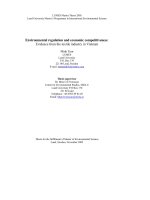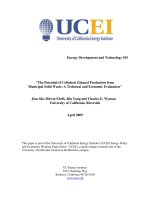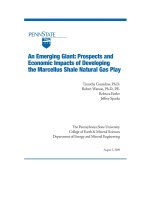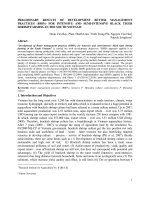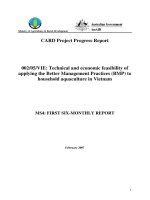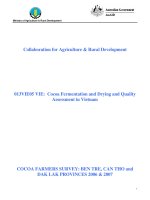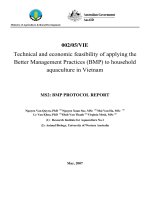Collaboration for Agriculture & Rural Development:: " Technical and economic feasibility of applying the Better Management Practices (BMP) to household aquaculture in Vietnam - MS 9 " pot
Bạn đang xem bản rút gọn của tài liệu. Xem và tải ngay bản đầy đủ của tài liệu tại đây (3.04 MB, 51 trang )
Ministry of Agriculture and Rural Development
COLLABORATION FOR AGRICULTURE
AND RURAL DEVELOPMENT (CARD)
002/05 VIE
Technical and economic feasibility of applying
the Better Management Practices (BMP) to
household aquaculture in Vietnam
MS 9: Staff Competencies Report
Research Institute for Aquaculture No 1 (RIA1), Tu Son, Bac Ninh
The University of Western Australia, 35 Stirling Hwy, NEDLANDS WA 6907
- 2008 -
The Research Institute for Aquaculture No.1 The University of Western Australia
LIST OF ABBREVIATIONS
BMP Better Management Practice
CARD
Collaboration for Agriculture and Rural Development
CV
Curriculum Vitae
CoE
Centre of Extension
HAU
Hanoi Agriculture University
PCC
People Committee of Commune
MoFI
Ministry of Fisheries
NAFIQUAVED
National Fisheries Quality Assurance and Veterinary Directorate
RIA1 Research Institute for Aquaculture Number 1
UWA University of Western Australia
ViFINET Vietnamese Fisheries Research and Education Organization Network
LIST OF FIGURES
Figure 1: Organizational chart of RIA1 6
Figure 2: Some pictures of projects’ training materials 11
Figure 3: Some pictures of training courses for extension staff and trial farms 12
Figure 4: Some pictures of training courses (group discussion) 12
Figure 5: Some pictures show team leader present the discussion results 13
Figure 6: Presentation of projects’ coordinator at ViFINET workshop 14
Figure 7: Presentation of projects’ coordinator at the young scientists workshop 14
Figure 8: Chart of projects’ organization in provinces 17
Figure 9: Some pictures of project activities in Nghe An province 20
Figure 10: Some pictures of project activities in Ha Tinh province 20
Figure 11: Some pictures of project activities in Thua Thien Hue province 21
Milestone Report Staff competencies
2
The Research Institute for Aquaculture No.1 The University of Western Australia
TABLE OF CONTENTS
I. INTRODUTION
5
1.1 Brief introduction
5
1.2 Acknowledgements
5
1.3 Disclaimer
5
II. COMPETENCY OF RIA1 STAFF AND PROJECTS’ VIETNAMESE EXPERTS
IN BMP AND ABILITY TO TRAIN FISHERIES EXTENSION STAFF AND
MOTIVATED FARMERS.
6
2.1. The main information of Research Institute for Aquaculture Number 1.
6
2.2. The key officers and experts of RIA1 participating project.
7
2.2.1 The current status situation at the start of the project.
7
2.2.2 Selection of project staff and experts.
7
2.2.2.1 Selection of project managers.
7
2.2.2.2 Selection of project shrimp culture expert.
7
2.2.2.3 Selection of project fisheries disease expert.
8
2.2.2.4 Selection of project aquaculture environment expert.
8
2.2.2.5 Selection of project socioeconomic and community base management
expert
9
2.2.2.6 Selection of guest expert on aquaculture quality management and food
safety management
9
2.1.3 Competency of projects’ staff and experts in BMP techniques and ability to
train fisheries extension staff and farmers
10
2.1.3.1 Training materials to train extension workers and trial farms.
10
2.1.3.2 Training methodologies
11
2.2.4 Some other activities that improving project staff capacities.
13
2.2.4.1 The short trip of project team to University of Western Australia
13
2.2.4.2 Attendant of the international workshop in aquaculture at Cantho
University.
14
2.2.4.3 Attendant of the young scientists workshop at RIA1.
14
2.2.4.4 Supervision of bachelor and master students
15
III. COMPETENCY OF PROVINCIAL EXTENSION STAFF AND ABILITY TO
TRAIN SHRIMP FARMERS ON BMP
15
3.1. Selection of provincial officers and extension staff to implement project
15
3.1.1 The results of local staff selection to implement project and the organization
chart of project at local level.
16
3.1.1.1 Nghe An province
16
Milestone Report Staff competencies
3
The Research Institute for Aquaculture No.1 The University of Western Australia
3.1.1.2 Ha Tinh province
16
3.1.1.3 Thua Thien Hue province
16
3.1.1.4 Project organization chart at local level
17
3.1.2 Competency of provincial extension staff.
17
3.1.2.1 Nghe An province
18
3.1.2.2 Ha Tinh province
18
3.1.2.3 Thua Thien Hue province
18
3.2 Some main results of training shrimp farmers implemented by extension staff.
19
IV. COMPETENCY OF DEMONSTRATION FARMS AND CONNECTION
WITH SHRIMP COMMUNITIES IN LOCAL
21
4.1. The competency requirements of demonstration farms
21
4.2. Connection demonstration farms with shrimp communities
22
4.2.1 In Nghe An province:
22
4.2.1 In Ha Tinh province:
22
4.2.3 In Thua Thien Hue province:
23
V. EFFECTIVENESS AND SUSTAINABILITY OF AQUA-
CLUBS/ASSOCIATIONS AS A MECHANISM OF EXTENSION BEYOND
TARGET SMALL HOLDERS
23
5.1. Selection of suitable shrimp aquaculture communities to develop sustainability
at the project end.
23
5.2. Shrimp aquaculture communities organization and project promotion to local
organization.
23
VI. APPENDISES
25
6.1. Appendix 1. Curriculum Vitae of some project staff.
25
6.2. Appendix 2. The outline contents of some training materials
40
6.3 Appendix 3. Lists of farmers attended training courses
43
Milestone Report Staff competencies
4
The Research Institute for Aquaculture No.1 The University of Western Australia
I. INTRODUTION
1.1 Brief introduction
This report presents the information on competencies of Vietnamese persons or
organizations who implementing the CARD 002/05 VIE project. In the highest of
endeavor, the authors tried to show brief and sufficient results of capacities assessment
of the projects’ related parties though the collected information. The parties that were
assessed in this report include 3 groups that are: i) persons or organizations at central
level; ii) persons or organizations at provincial level; and iii) persons or organizations at
local level.
The report proceeds with an analysis of central project staff and experts competencies
and ability to train provincial extension staff and trial farms (Section 2), follow by an
assessment of provincial project extension staff and ability to trial local shrimp farmers
(Section 3), competencies of local project staff and demonstration farms and the
connection to the communities (Section 4), and the effectiveness and sustainability of
aqua-clubs/ associations in project locations (Section 5). The report finishes with the
appendices that occupies important information of some project staff CV, outlines of
training materials contents, and lists of attended farmers of training courses.
1.2 Acknowledgement
To complete this report, the authors received a lot of personal and organizational
information from related persons and parties. The authors would like to thank the
projects’ staff, experts, extension workers, field staff, communes/cooperatives, shrimp
communities, demonstration farms and shrimp households in the projects’ locations. By
many ways, direct or indirect, organizations and persons who cited in this report provided
a very suitable information to contribution of report completion. Once again, the authors
give the acknowledgments to they all.
1.3 Disclaimer
The information contained in this report is based on sources believed to be reliable.
While this report preparation, every information has been verified in this report.
Therefore, RIA1 and UWA do not give any prediction, assurance or warranty in relation
to the accuracy of or fitness for any particular use or application of, any personal
information or scientific information or other result contained in this report. Neither
RIA1 and UWA nor any of its employees shall be liable for any costs, claim, liability,
damage, loss, injury or the like, which may be suffered or incurred as a direct or indirect
results of the reliance by any person on any information contained in this report.
Milestone Report Staff competencies
5
II. COMPETENCY OF RIA1 STAFF AND PROJECTS’
VIETNAMESE EXPERTS IN BMP AND ABILITY TO TRAIN
FISHERIES EXTENSION STAFF AND MOTIVATED FARMERS.
2.1. The main information of Research Institute for Aquaculture 1.
Research Institute for Aquaculture No.1 was established in 1963. Throughout its 45
years of development, RIA1 has gone through many difficulties and has emerged as an
institute that plays an important role in aquaculture development in North Vietnam.
Currently, the RIA1 is a multifunctional institute focused on research, extension and
training in aquaculture and resource protection.
At current time, RIA1 has 360 staff (2007). Young staff and staff who hold bachelor and
high education qualification have significantly increased, making up to 53% (190
people). The number of staff with a doctorate qualification is 8 and 11 PhD students, 34
staff have master degrees. Most young staff have professional knowledge in aquaculture
and related fields.
RAI1, currently, has 7 departments, 5 research centers and 1 sub-institute. The main
function of institute is to carry out technological and scientific research in the field of
aquaculture including genetic and seed production, aquaculture techniques,
environmental management and disease prevention; resource protection and
development for coastal and freshwater areas; post-harvesting technology; and
technology innovation and transfer.
Figure 1
: Organizational chart of RIA1.
The Research Institute for Aquaculture No.1 The University of Western Australia
2.2. The key officers and experts of RIA1 participating project.
2.2.1 The current status situation at the start of the project.
At the start of this BMP project, many staff and experts at RIA1 had a
significant
understanding of Better Management Practice theory. However, there were no any
similar project implemented by RIA1. Therefore, experiences in carry out and implement
apply BMP into produced reality is limited. Additional, BMP application to shrimp
aquaculture requires a collective knowledge on culture techniques, environmental and
disease monitoring, socio-economic and community base development. Actually, RIA1s’
researchers are responsible for different fields.
In order to overcome the constraints as above, the selection of project staff who have a
professional knowledge and experiences to participate project is a requirement. Beside, a
very important thing is to group staff which different fields to implement the project.
Therefore, at the start of the project, selection of appropriate staff to join project in order
to carry out success and
sustainable at project end.
2.2.2 Selection of project staff and experts.
2.2.2.1 Selection of project managers.
After approving of the project by CARD, Dr Le Xan, Vice Director of RIA1 was
nominated as project director by Director of RIA1. Dr Le Xan has more than 30 years of
experience in marine and brackish water aquaculture and many years experience in
project management. Thus, the project director who is direct management and operation
of this project had a professional knowledge on shrimp aquaculture and project
management skills. This is a first advantageous of the project. Mr. Nguyen Xuan Suc
was nominated as the project coordinator. Mr Suc has a ten years experience in project
implementation or project management that related to rural development (please see
attach of CV for more details)
2.2.2.2 Selection of project shrimp culture expert.
Shrimp culture expert who was responsible for project implement of shrimp culture
techniques and related activities. The culture expert has also responsibly to draft culture
techniques document and to train, to transfer shrimp culture knowledge to extension staff
and farmers through training courses and workshops that held during project
implementation. In addition, the culture expert has an important mission to propose, to
solve problems, constrains of culture techniques for shrimp farmers during crops. To
Milestone Report Staff competencies
7
The Research Institute for Aquaculture No.1 The University of Western Australia
meet the above requirements, Dr Nguyen Van Quyen, from Marine National Broodstock
Center, was nominated as shrimp culture expert of project. Dr Nguyen Van Quyen has
more than 30 years experience in marine and brackish water aquaculture. Of which,
brackish water aquaculture is the professional experience of Dr Quyen. Dr Quyen had
successfully implemented a number of project that related to shrimp aquaculture
techniques of different shrimp species such as
P. monodon
,
P. japonicus
,
M. ensis
,
P.
orentalis
and he is an expert in shrimp seed production in North Vietnam (for more
detail please see attach of CV)
2.2.2.3 Selection of project fisheries disease expert.
Fisheries disease expert who help project team to monitor and solve problems that
related to shrimp disease during shrimp crops. Fisheries disease expert has responsible to
provide knowledge on shrimp diseases and disease management to extension staff and
farmers through training courses. Disease expert provide methods and labs to check
shrimp seed before stocking due to free of diseases seed for farmers in the project
locations. In addition, disease expert has responsibility to monitor the shrimp health
during crops in order to limit the damage for shrimp farmers in the project areas.
Satisfaction of requirement, Dr Le Van Khoa, from Center for Environment and Disease
Monitoring in Aquaculture, was nominated as fisheries expert of project. Dr Le Van
Khoa has more than 10 years experience research on fisheries disease and disease in
aquaculture (for more detail please see attach of CV)
2.2.2.4 Selection of project aquaculture environment expert.
Environmental management in aquaculture, specially in shrimp culture is an important
role to results of production of shrimp farmers. Environment expert of project requires a
person who has a professional knowledge in water environment management.
Concurrently, environment expert need to has abilities, skills to transfer and guide
extension staff and demonstration farms monitoring and testing the environmental
indicators during shrimp culture crops. Additional, environment expert was responsible
to draft environment management documents and train extension staff and farmers on
environment monitoring and testing through training courses and workshops. To meet
those, Mr Mai Van Ha, from Center for Environment and Disease Monitoring in
Aquaculture, was selected as environment expert of project. Mr Ha has around 10 years
of experience in study and implement environment and related issues. Mr Ha was also
managed or participated many projects that related to rural development (for more
details please see attach of CV)
Milestone Report Staff competencies
8
The Research Institute for Aquaculture No.1 The University of Western Australia
2.2.2.5 Selection of project socioeconomic and community base
management expert
Small-scale shrimp aquaculture in Vietnam is a community base operation. In this
operation, many resources is shared among shrimp farms in community such as water
resource, environment issues. Small-scale shrimp aquaculture is also required
associating individual farm into group in order to reduce constraints and bring into play
advantages for example shrimp disease risk limiting, general environmental
management, market chain linkage and so on. Therefore, the socioeconomic and
community base management expert play an important role to connect closely among
producers and between shrimp communities and others related partners such as local
authorities, research units, extension units, and enterprises that supply for and consume
of products. On the other hand, socioeconomic and community base management expert
has a responsible to draft documents and transfer related knowledge to extension
workers and shrimp farmers through training courses and workshop. Mr Dinh Van
Thanh, from Center for Fisheries Technology Transfer, Application and Design
Consultancy, who meet requirement, was selected as socioeconomic and community
base expert of project. Mr Thanh has more than 30 years experience in aquaculture and
in the lately 15 years, the main his studies related to socioeconomic and community
development. Mr Thanh had managed or participated a number of national and
international projects on rural development (for more detail please see the attach of CV)
2.2.2.6 Selection of guest expert on aquaculture quality management and
food safety management
One of the projects’ objective is to improve capacity on aquaculture quality management
and food safety for shrimp aquaculture producers. To achieve this, project has been
cooperated with NAFIQUAVED branch 1 to implement this content. The responsibility
of this partner is to provide an expert to help project organizing and training local staff
and farmers on aquaculture quality and food safety management in both producing and
processing products. NAFIQUAVED is also responsible to check the shrimp quality
products annually of projects’ areas during project life. As the results, Mr Vu Van In was
nominated as projects’ food safety expert. Mr In has more than 10 years working
experience on aquaculture quality management and food safety management. In
addition, Mr In organized and directly trained of many courses of this field for
processors, culture producers and fisheries officers.
Milestone Report Staff competencies
9
The Research Institute for Aquaculture No.1 The University of Western Australia
2.1.3 Competency of projects’ staff and experts in BMP techniques and
ability to train fisheries extension staff and farmers
2.1.3.1 Training materials to train extension workers and trial farms.
At the start stage of project, before beginning of 2007 crop, the BMP protocol was
documented by project management team and Vietnamese expert team. Then, a meeting
among RIA1 project staff, local fisheries officers, extension staff and 9 trial farms was
organized in order to discuss and get comments from local staff to improve quality of the
BMP protocol and make it corresponding with project location conditions.
Base on the guidelines in the BMP protocol, the training material was developed in
specific field by project expert. After that, those training materials was checked, repaired
and completed by project management team and the author before training extension
staff and demonstration farm in project provinces though training courses. As the results,
the training materials prepared as following:
• Major disease of P. monodon in Vietnam, prepared by Dr Le Van Khoa,
• Environment management in aquaculture, prepared by Mr Mai Van Ha and Mr
Nguyen Duc Binh,
• Community base management methods in aquaculture, prepared by Mr Nguyen Xuan
Suc and Mr Dinh Van Thanh,
• Semi-intensive and improved extensive shrimp aquaculture techniques, prepared by
Dr Nguyen Van Quyen, and
• Aquaculture products quality management, prepared by Mr Vu Van In (from
NAFIQUAVED Branch 1).
In addition, a very important prepared material is shrimp culture diary using by
demonstration farms to record all input and output data of shrimp operation activities
during crops. This document was prepared by project team and expert team with
comments from local staff and farmers.
Milestone Report Staff competencies
10
The Research Institute for Aquaculture No.1 The University of Western Australia
Figure 2
: Some pictures of projects’ training materials
2.1.3.2 Training methodologies
This BMP project applied the training method that “train of trainers” (ToT), it mean that
the project experts trained extension staff and demonstration farms on the specific field in
aquaculture and training methodologies. After that, the trainees (extension staff) who
attended those training courses have responsible to train shrimp farmers in the project
communities.
This training method is a modern and effective methodologies because trainees were
provided the academic knowledge and experience from project experts. Beside that,
extension staff combined the academic knowledge from expert with their reality
experience and then effectively transferring to shrimp farmers in the local communities
Milestone Report Staff competencies
11
The Research Institute for Aquaculture No.1 The University of Western Australia
Figure 3
: Some pictures of training courses for extension staff and trial farms
This BMP project also applies the “open” training method, it mean that trainees were
“centre” of training courses. In each training course, the expert provided training
materials (handout) and presented the main ideas of the lesson, then trainees were divided
into small groups to discuss the lesson issues that provided by trainers and give questions
to trainers and among trainees.
Figure 4
: Some pictures of training courses (group discussion)
Milestone Report Staff competencies
12
The Research Institute for Aquaculture No.1 The University of Western Australia
After discussing section, each trainee team provided a key person who present the results
of discussion in order to find out the main issues that need to be solved and problems that
they interested in.
Figure 5
: Some pictures show team leader present the discussion results
2.2.4 Some other activities that improving project staff capacities.
2.2.4.1 The short trip of project team to University of Western Australia
In November 2007, a team of 03 project staff (include Mr Nguyen Xuan Suc, Mr Dinh
Van Thanh and Mr Bui Kien Cuong) did a short trip (10 days) to UWA. During this trip,
Vietnamese project team worked directly with Australian project team (include Dr
Elizabeth Petersen and Ms Virginia Mosk). The activities that done during this trip are: i)
assessment the 2007 projects’ activities and discussion for projects’ activities in 2008; ii)
discussion on data processing methods and initial data processing on trial farms results
analysis; and iii) completion of details outline for “Environmental and Economic
Evaluation of Better Management Practices for Shrimp Culture in Vietnam” report. In
addition, this is a occasion for projects’ Vietnamese team visit and understand the
training methodology and scientific research of the Agricultural and Resource Economics
School under UWA.
Milestone Report Staff competencies
13
The Research Institute for Aquaculture No.1 The University of Western Australia
2.2.4.2 Attendant of the international workshop in aquaculture at Cantho
University.
From 05 to 08 December 2008, Vietnamese Fisheries Research and Education
Organizations Network (ViFINET) cooperated with Gent University from Belgium
Kingdom organized the international workshop that “ViFINET International Aquaculture
Workshop” held in Cantho University. In this workshop, the projects’ coordinator (Mr
Nguyen Xuan Suc) has had a opportunity to present the report that “Environmental and
Economic Evaluation of Better Management Practices for Shrimp Culture in North
Center Vietnam”.
Figure 6
: Presentation of projects’ coordinator at ViFINET workshop
2.2.4.3 Attendant of the young scientists workshop at RIA1.
On occasion of 45
th
years of establishment of RIA1, the young scientific researchers
workshop on aquaculture was organized at RIA1 by 18 Dec. 2008. Project nominated a
projects’ representative (Mr Nguyen Xuan Suc, project coordinator) to present a topic
that “some achievement results of BMP project in North Center Vietnam”. This also is a
opportunity for our project to diffuse the contents and results of project to young
aquaculture scientists over whole country.
HỘI THẢO TOÀN QUỐC KHOA HỌC TRẺ VỀ NUÔI TRỒNG THUỶ SẢN
RIA1, Dec. 18/2008
Một số kết quả dự án:
Tính khả thi về kinh tế và kỹ thuật của việc áp
dụng BMP trong nuôi trồng thuỷ sản quy mô
nhỏởViệt Nam
Presenter: Nguyen Xuan Suc
Reseach Institute for Aquacultre No1
Figure 7
: Presentation of projects’ coordinator at the young scientists workshop
Milestone Report Staff competencies
14
The Research Institute for Aquaculture No.1 The University of Western Australia
2.2.4.4 Supervision of bachelor and master students
Project has partly supported financial and supervising research methodologies for two
students. In 2007, student Le Thi Thuy, from Hanoi Agriculture University, did her
bachelor thesis that “ Assessment of current status and effective of coastal aquaculture to
livelihood of farmers in Vinh Hung commune – Thua Thien Hue province”, supervised
by Dr Vu Thi Phuong Thuy (HAU) and Mr Nguyen Xuan Suc (RIA1). In 2008, student
Le Thi Thanh Thuy, master course at RIA1, doing her master thesis that “ Assessment of
effectiveness and impact of BMP application in shrimp aquaculture to small-scale
household in Nghe An and Thua Thien Hue provinces”, supervised by Dr Le Xan and Mr
Nguyen Xuan Suc. Ms Thuy’s master thesis will be approved shortly.
III. COMPETENCY OF PROVINCIAL EXTENSION STAFF AND
ABILITY TO TRAIN SHRIMP FARMERS ON BMP
3.1. Selection of provincial officers and extension staff to implement
project
After project approving, the project team at RIA1 believed that this BMP project is a
community base project. Therefore, cooperation between RIA1 and provincial
department of fisheries is necessary to achieve the successful results at project end.
Project team organized 3 meeting with department of fisheries in project provinces. In
these meeting, the directors of fisheries department of 3 provinces agreed to nominate
Center of Extension as main partner in each province implement the project. Provincial
Center of Extension is organization that has responsible to transfer techniques into
fisheries operation in local province. Additional, Provincial Centre of Extension carry
out the trials, training courses in communities. Therefore, selection of Extension Center
as project partner in provinces is necessary and judicious.
In each province, a team, include extension staff, commune/cooperative officers, aqua-
club/association and trial farms, was formed to implement the BMP project. Of which,
the director of Extension Center is team leader, has responsible to supervise, manage the
project activities in province. In each province, a extension workers who has experience
and ability was selected as project field staff. Commune/cooperative officers help project
field staff working with shrimp communities in project commune, and supervise the
application of regulations that provide by local communes to aquaculture farmers.
Milestone Report Staff competencies
15
The Research Institute for Aquaculture No.1 The University of Western Australia
3.1.1 The results of local staff selection to implement project and the
organization chart of project at local level.
3.1.1.1 Nghe An province
1. Mr Tran Xuan Tinh, Director of Extension Center as team leader.
2. Mr Pham Ngoc Hung, extension worker as project field staff
3. Mr Chu Van Ngu, head of cooperative and and Mr Dinh Van Can, head of qua-
association as project local staff.
4. Three demonstration farms:
- Farm: Nguyen Van Tuan
- Farm: Cao Xuan Hoa
- Fam: Dinh Van Dung
3.1.1.2 Ha Tinh province
1. Mr Nguyen Cong Hoang, Director of Extension Center as team leader.
2. Mr Luu Quang Can, extension worker as project field staff
3. Mr Truong Cong Trung, vice president of Thach Ha commune as project local staff.
4. Three demonstration farms:
- Farm: Nguyen Hong Quyen
- Farm: Nguyen Ngoc Hanh
- Fam: Hoang Xuan Kien
3.1.1.3 Thua Thien Hue province
1. Ms Vo Thi Tuyet Hong, Director of Extension Center as team leader.
2. Mr Pham Minh Duc, extension worker as project field staff
3. Mr Le Cong Hung, president of Vinh Hung commune and Mr Hau Van Anh, head of
Dai Thang cooperative as project local staff.
4. Three demonstration farms:
- Farm: Phan Ngan
- Farm: Hau Van Anh
- Fam: Dinh Van Van
Milestone Report Staff competencies
16
The Research Institute for Aquaculture No.1 The University of Western Australia
3.1.1.4 Project organization chart at local level
The project selected participants in different local level were organized as below:
Director of
CoE
Commune
Cooperative
(
team leade
r
)
Extension
worker
Trial
farms
(
field staff
)
Project
Shrimp
communities
Figure 8
: Chart of projects’ organization in provinces
3.1.2 Competency of provincial extension staff.
Provincial extension staff play an important role in this BMP project because they
directly trained shrimp farmers in the project communities. Therefore, selection of
extension workers who has good experience and ability skills related to shrimp
aquaculture as project field staff is necessary. The project team provided a member of
criterion to select extension staff as project field staff that are:
- Bachelor degree in aquaculture or related
- At least 5 years experience in aquaculture or related field
- Ability to receive BMP knowledge from BMP training courses
- Ability to transfer, train BMP knowledge and practice skill to farmers
- Ability to promote shrimp farmers in communities
- Ability to manage demonstration farms
- Ability to do fieldtrip as project requirement
- Priority local extension staff
To meet the above requirements, the results of project field staff selection at provinces is
as following:
Milestone Report Staff competencies
17
The Research Institute for Aquaculture No.1 The University of Western Australia
3.1.2.1 Nghe An province
Mr Pham Ngoc Hung was selected as project field staff in Nghe An province. Mr Hung
graduated from Vinh University in 2000, the specific field of Mr Hung is Aquaculture.
Mr Hung has been working for Nghe An Fisheries Extension Center since 2001, thus he
has 7 years experience in fisheries extension field. Mr Hung is responsible to manage the
brackish water farm trials of Extension Center and annually organize training courses
and directly train the farmers. Mr Hung was born and working in Nghe An province,
therefore he understand deeply people and culture in this project location.
3.1.2.2 Ha Tinh province
Project selected Mr Luu Quang Can as project field staff in Ha Tinh province. Mr Can
graduated from Vinh University in 1998, the his main stream is Aquaculture. He had
been worked for SUDA project (cooperation between MoFI and Denmark) from 1998 to
2004, then he has been working for Ha Tinh Fisheries Extension Center since 2004. Mr
Can attended a number of training courses on aquaculture as well as he organized and
trained many coastal aquaculture farmers. Mr Can is local person, so he understand
profoundly the customs, culture and people there.
3.1.2.3 Thua Thien Hue province
Mr Pham Minh Duc was chosen as project field staff in Thua Thien Hue province. Mr
Duc graduated from Hue University of Agriculture and Forestry in 1997. His main field
study is Aquaculture. He has been working for Thua Thien Hue Fisheries Extension
Center since 1998. He is head of Phu Loc district Extension Center Branch where
project located in Thua Thien Hue. Mr Duc has capacity and experience in organizing
and training the shrimp aquaculture farmers. Mr Duc was also born and working at Thua
Thien Hue province, thus he know strongly the culture and people in Thua Thien Hue.
To sum up, project selected the field staff in 3 project provinces. The field staff who
selected satisfy the requirements provided by project at beginning. As the results, during
project time life, those field staff show that they has reality ability and experience in
management of demonstration farms and transferring knowledge and practice skills in
shrimp aquaculture to the projects’ farmers.
Milestone Report Staff competencies
18
The Research Institute for Aquaculture No.1 The University of Western Australia
3.2 Some main results of training shrimp farmers implemented by
extension staff.
After receiving BMP knowledge though training courses run by project managers and
project experts, the project extension field staff organized and trained shrimp farmers in
communities. In each province, project team in cooperation with project field staff had
successfully organized 03 training courses on BMP for shrimp farmers. The contents of
these training courses are: i) methodology of pond preparation and seed selection, seed
stocking; ii) methodology of pond management during shrimp culture crops; and iii)
methodology of organization and cooperation of farmers in shrimp communities. In
addition, during crop, monthly project field staff organized the shrimp community base
meeting to solve constrains and explain the difficulties that shrimp farmers requirement.
The method of training for communities of shrimp farmers is “local” and field training.
Training courses were organized in project shrimp villages, the BMP knowledge gave to
farmers in the room as well as skills practiced in the field. By this way, farmers not only
caught the theory on BMP but also practice BMP skills and discuss with extension staff
and project staff and other shrimp households as well.
The total people who attended those training courses is around 300 attendees (please see
list in the attach for more details). This is the project expectation results due to
implementing the BMP to widely shrimp aquaculture communities, and hope that in the
future the BMP will pervasive widely to other communities that out side project
locations.
Milestone Report Staff competencies
19
The Research Institute for Aquaculture No.1 The University of Western Australia
Figure 9
: Some pictures of project activities in Nghe An province
Figure 10
: Some pictures of project activities in Ha Tinh province
Milestone Report Staff competencies
20
The Research Institute for Aquaculture No.1 The University of Western Australia
Figure 11
: Some pictures of project activities in Thua Thien Hue province
IV. COMPETENCY OF DEMONSTRATION FARMS AND
CONNECTION WITH SHRIMP COMMUNITIES IN LOCAL
4.1. The competency requirements of demonstration farms
At the start of project phase, the project team determines that selection of suitable
demonstration farms is very important activity. The requirement to demonstration farms
is that they are the core shrimp household in the project community. Demonstration
farms need to have ability to receive the BMP knowledge and practice skills as a
outstanding level in order to present BMP widely into communities and they are the
“modern” for shrimp household follow. Demonstration farms play role to connect other
farms in village, cooperation and easy to share experience and guidance the neighbor
shrimp households to approach the BMP as quick and effective. Therefore, the some
criterions to demonstration farms was provided as following:
•
At least 5 years experience in shrimp aquaculture
•
Suitable infrastructure (culture pond, processing pond, inlet, outlet, materials)
•
Potential finance to implement BMP
•
Voluntary to apply BMP requirements
Milestone Report Staff competencies
21
The Research Institute for Aquaculture No.1 The University of Western Australia
•
Ability to receive BMP knowledge and practice skills though training courses
•
Easy and voluntary to help other shrimp farm in communities.
In order to selection of suitable demonstration farms, project team organized meeting
with Fisheries Extension Centre, Commune/cooperative to discuss this issues in each
province. The criterions to chose demonstration was agreed among partners, then
commune/cooperative provided a list of shrimp farms that meet requirements. Base on
this list, project staff and local officers did a fieldtrip to village to check the listed farms.
As the results, project selected 03 farms in each province who meet fully requirements as
demonstration farms (please see list of demonstration farms in section 3.1.1)
4.2. Connection demonstration farms with shrimp communities
The main purpose of this project is to implement BMP into wide shrimp communities.
The connection of demonstration farms with other shrimp households in communities
due to implement BMP into communities such the most effective. Demonstration farm is
a nuclear household in the aqua-club/association, thus the BMP knowledge, skills that
demonstration farms receive from project will pervasive into communities. This is the
best approach to transfer BMP techniques and management methods to shrimp
producers. Specially, in small-scale aquaculture, it is limited the finance and production
practice skills, this connection become more important. The results of connection
between trial farms and communities in each province as follow:
4.2.1 In Nghe An province:
Mr Tuans’ demonstration farm was connected to 28 other shrimp farms in Hung Hoa
No.1 village. This is a semi-intensive shrimp aquaculture community.
Mr Hoas’ demonstration farm was connected to 25 other shrimp farms in Hung Hoa
No.2 village. This is a improved shrimp aquaculture community.
Mr Dungs’ demonstration farm was connected to 32 other shrimp farms in Hung Hoa
No.2 village. This is a improved shrimp aquaculture community.
4.2.1 In Ha Tinh province:
Mr Hanhs’ demonstration farm was connected to 22 other shrimp farm in Hong Ha
village. This is a semi-intensive shrimp aquaculture community.
Mr Quyens’ demonstration farm was connected to 23 other shrimp farms in Lien Ha
village. This is a improved shrimp aquaculture community.
Mr Kiens’ demonstration farm was connected to 24 other shrimp farms in Lien Ha
village. This is a improved shrimp aquaculture community.
Milestone Report Staff competencies
22
The Research Institute for Aquaculture No.1 The University of Western Australia
4.2.3 In Thua Thien Hue province:
In Dinh Doi village has 73 shrimp households, they were divided into 3 qua-club. Each
of this aqua-club was connected to a demonstration farm, namely Mr Anh, Mr Ngan and
Mr Van trial farms. Those aqua-club are managed by Dai Thang aquaculture
cooperative.
V. EFFECTIVENESS AND SUSTAINABILITY OF AQUA-
CLUBS/ASSOCIATIONS AS A MECHANISM OF EXTENSION
BEYOND TARGET SMALL HOLDERS
5.1. Selection of suitable shrimp aquaculture communities to
develop sustainability at the project end.
A very important step to contribute to the success of the project end is selection of
suitable communities for implementing project at local areas. Selected projects’ shrimp
communities need to meet the requirement that its working sustainability of project
results for long time after project finishing. To meet this objective, the selected
communities satisfies some technical requirements that as follows:
•
Small scale households (less than 2 ha of shrimp pond/farm)
•
Suitable shrimp areas planning
•
Number of households between 20 and 30
•
Semi-intensive or improved extensive culture stype.
•
Households in community volunteer to apply BMP
•
Demand on project support of diseases, environmental monitoring and community
base management
Before selecting, project managers had meeting with local officers to allocate and show
criterion of communities selection and did a fieldtrip to shrimp communities in the
project sites. As the results, following communities have been selected to apply BMP in
communities level:
•
Nghe An province: selection 3 communities in 2 villages namely Hung Hoa 1
and Hung Hoa 2.
•
Ha Tinh province: selection 3 communities in 2 villages namely Hong Ha
and Lien Ha
•
Thua Thien Hue province: Selection 3 communities in Dinh Doi village,
Vinh Hung commune.
Milestone Report Staff competencies
23
The Research Institute for Aquaculture No.1 The University of Western Australia
5.2. Shrimp aquaculture communities organization and project
promotion to local organizations.
Aquaculture mechanism in different local areas in project sites is not the same. However,
the general point is that aquaculture activities controls by the People Committee of
Commune (PCC). PCC is organization that approves the aquaculture regulation at
commune level and supervises the application of Governments’ regulations in local such
as Fisheries Law.
In Hung Hoa commune (Nghe An province) and Vinh Hung commune (Thua Thien Hue
province), before project start, has the agriculture cooperative or the aquaculture
cooperative. Under cooperative is aqua-clubs or associations includes about 20 to 30
shrimp households. Cooperatives supervises the implementation of crop calendar
provided by Provincial Fisheries Department, monitors shrimp diseases outbreaks,
receives and implements the guidance from higher authorities such as from CPP, district
agriculture department and so on. In addition, Cooperatives also doing the shrimp input
services for example providing feed, fertilizes, anti-bio products if farmers requirements.
In those province, project have helped to improve the capacity of local aquaculture units
(cooperatives, aqua-clubs/association). To better effective operation of this units, project
supported partly financial to organize meeting monthly or unscheduled. Project
improved the communes’ aquaculture regulation, specifically improving issues that
related to public environment management and supervision of communities on diseases
management. In addition, many meeting among project staff, extension workers and
local officers were organized to improve the capacities on specialist knowledge and
management skills for local staff.
In Thach Ha commune (Ha Tinh province), aquaculture cooperative or associations has
not found, before project come there. Therefore, project helped PCC formed the 3 aqua-
clubs in Hong Ha and Lien Ha villages. Each aqua-club occupies 20 to shrimp
households, of which nominated a team leader and 2 vice team leaders to supervise the
project activities in these. Additional, project in cooperation with PCC drafted the local
aquaculture regulation. And partly financial and fully BMP knowledge were provided
from project to two aqua-associations.
Milestone Report Staff competencies
24
The Research Institute for Aquaculture No.1 The University of Western Australia
VI. APPENDISES
6.1. Appendix 1. Curriculum Vitae of some project staff.
CURRICULUM VITAE
1. Personal information
Name: Nguyen Xuan Suc
Nationality: Vietnamese
Date of birth: 25
th
May 1975
Sex: Male
Married status: Single
Place of birth: Thanh Hoa Province
Residential address: Dinh Bang - Tu Son - Bac Ninh, Vietnam
Tel: +84.04.8780407
Fax: +84.04.8780102
Mobile: +84.0983222894
Email:
2. Education
2004 – 2005: - Master in Rural Management, Curtin University of Technology,
Australia.
- AusAID Scholarship.
- Thesis title: Socio-economic Impact of Brackish-water Shrimp Culture in
the Coastal Region of North Vietnam.
2003 – 2004: - Graduate Diploma in Agribusiness, Curtin University of Technology,
Australia.
- AusAID Scholarship.
1995 – 1998: - Bachelor in Aquaculture, Nha Trang University of Fisheries, Vietnam.
- AIT Scholarship.
1992 – 1995: - Diploma in Basis, University of Forestry, Vietnam.
3. Language
Speaking Listening Reading Writing
English Very Good Very Good Very Good Very Good
Vietnamese Mother tongue
4. Professional career
7/2005 to date: Researcher,
Center for Advisory, Designing and Technology Transferring .
Research Institute for Aquaculture No.I.
Dinh Bang – Tu Son – Bac Ninh, Vietnam.
2002 to 6/2005: Student,
Milestone Report Staff competencies
25
